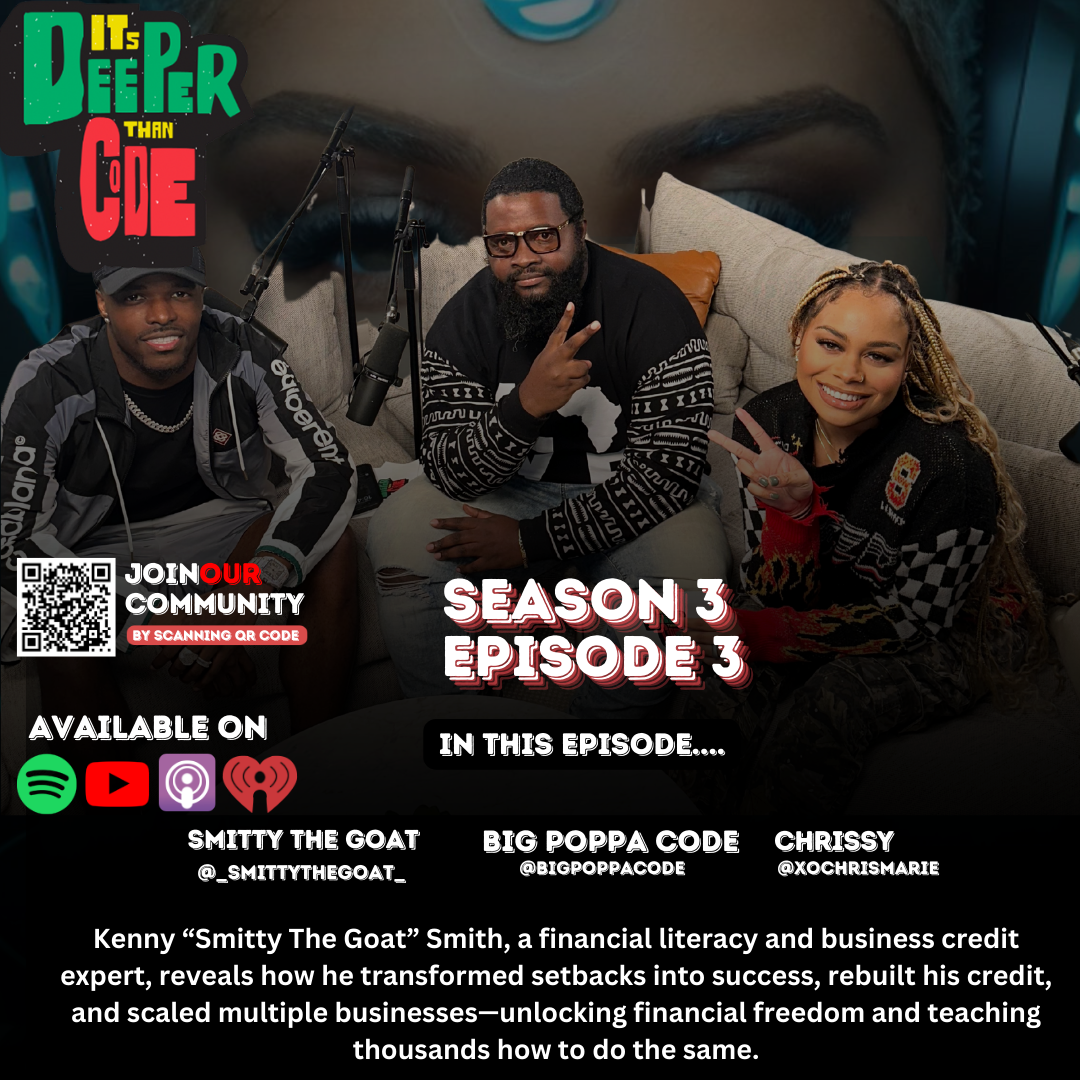Newsletter 1: The 2032 Thesis: AI, Ownership & The Future—Are You Ready?
How AI, Blockchain, and the Creator Economy Are Reshaping Power & Wealth
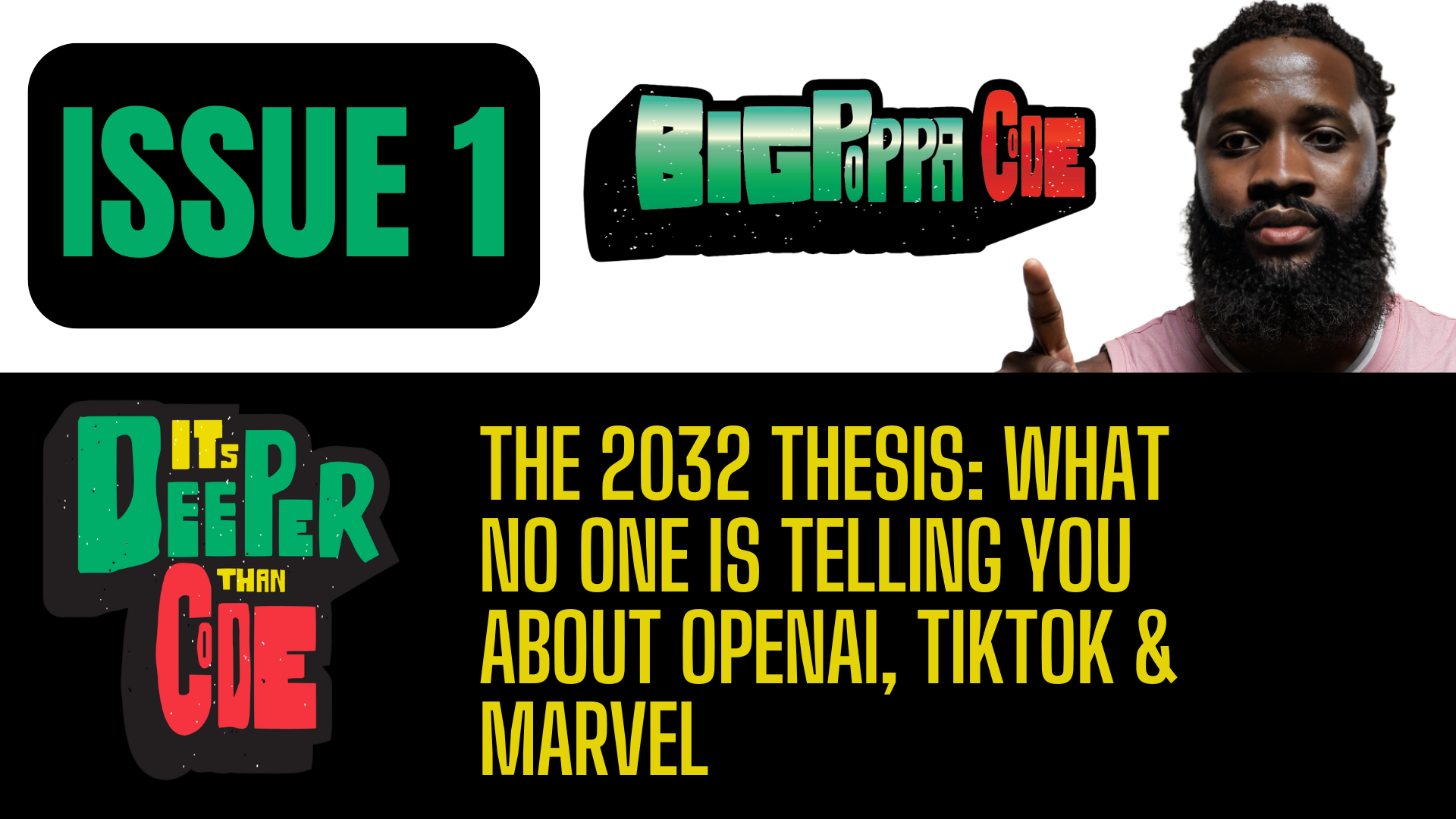
IT’S DEEPER THAN CODE NEWSLETTER: 1
“2032 Is Closer Than You Think: AI, Ownership & The Creator Economy”
🚨 Welcome to the first-ever edition of the It’s Deeper Than Code Newsletter! 🚨
We are standing at a crossroads. The Intelligence Age is here, and if you don’t understand how to navigate it, you’ll be left behind.
AI isn’t just changing the economy—it’s restructuring power.
It’s time to ask yourself: Will you be a builder or just a consumer?
This newsletter breaks down:
✅ How AI, blockchain, and the creator economy are converging into a new digital wealth paradigm
✅ Why ownership, not employment, is the key to surviving in 2032
✅ The investment plays, skills, and strategies you need to control your financial future
🔻 Read on, or just skim the bold sections for quick insights. Either way—take action.
🧠 THE 2032 THESIS: AI, THE CREATOR ECONOMY & THE FUTURE OF OWNERSHIP
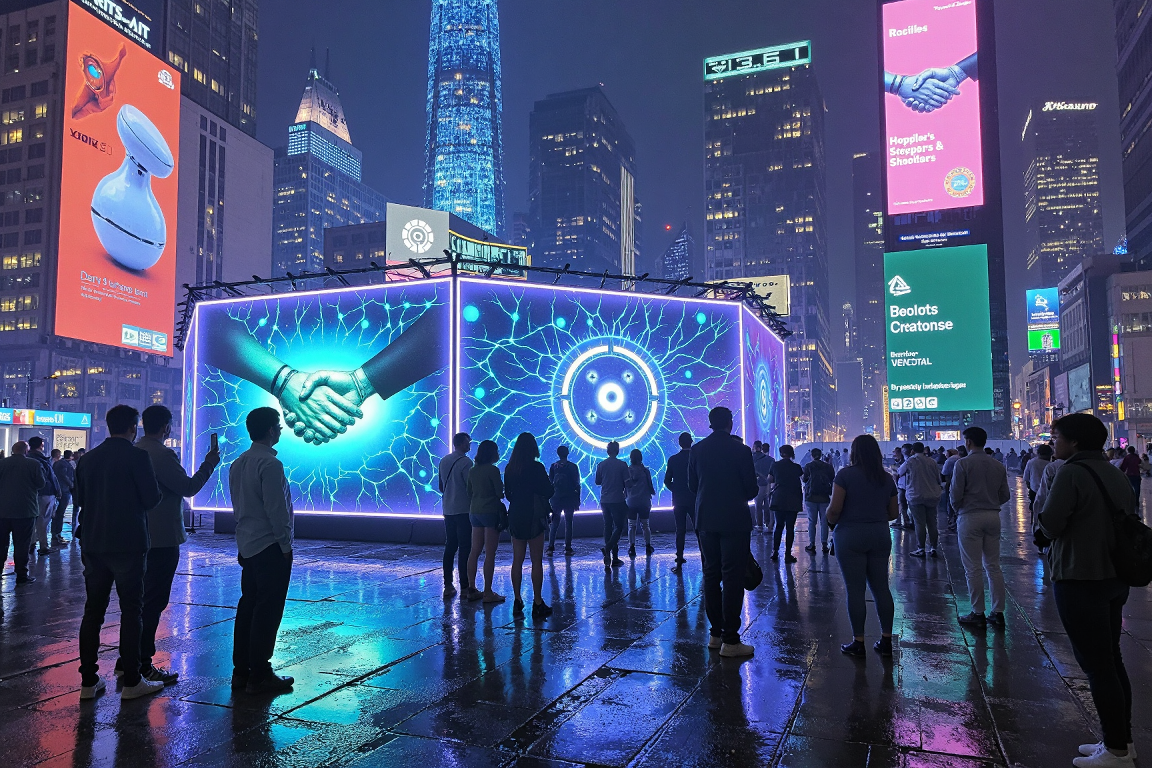
📌 INTRODUCTION: AI IS CHANGING EVERYTHING—FAST.
Technology moves faster than culture, and those who understand AI, blockchain, and decentralized ownership will win.
🔹 OpenAI’s Super Bowl ad confirmed what insiders already knew: AI is no longer a tool—it’s the new economic foundation.
🔹 ByteDance’s Omnihuman-1 can turn a single image into a full-motion AI video, revolutionizing content creation and making traditional production obsolete.
🔹 Marvel just fired X-Men ‘97 showrunner Beau DeMayo, proving that creators who don’t own their platforms will always be at the mercy of corporations.
🛠️ PART 1: THE INTELLIGENCE AGE & AI-POWERED WEALTH
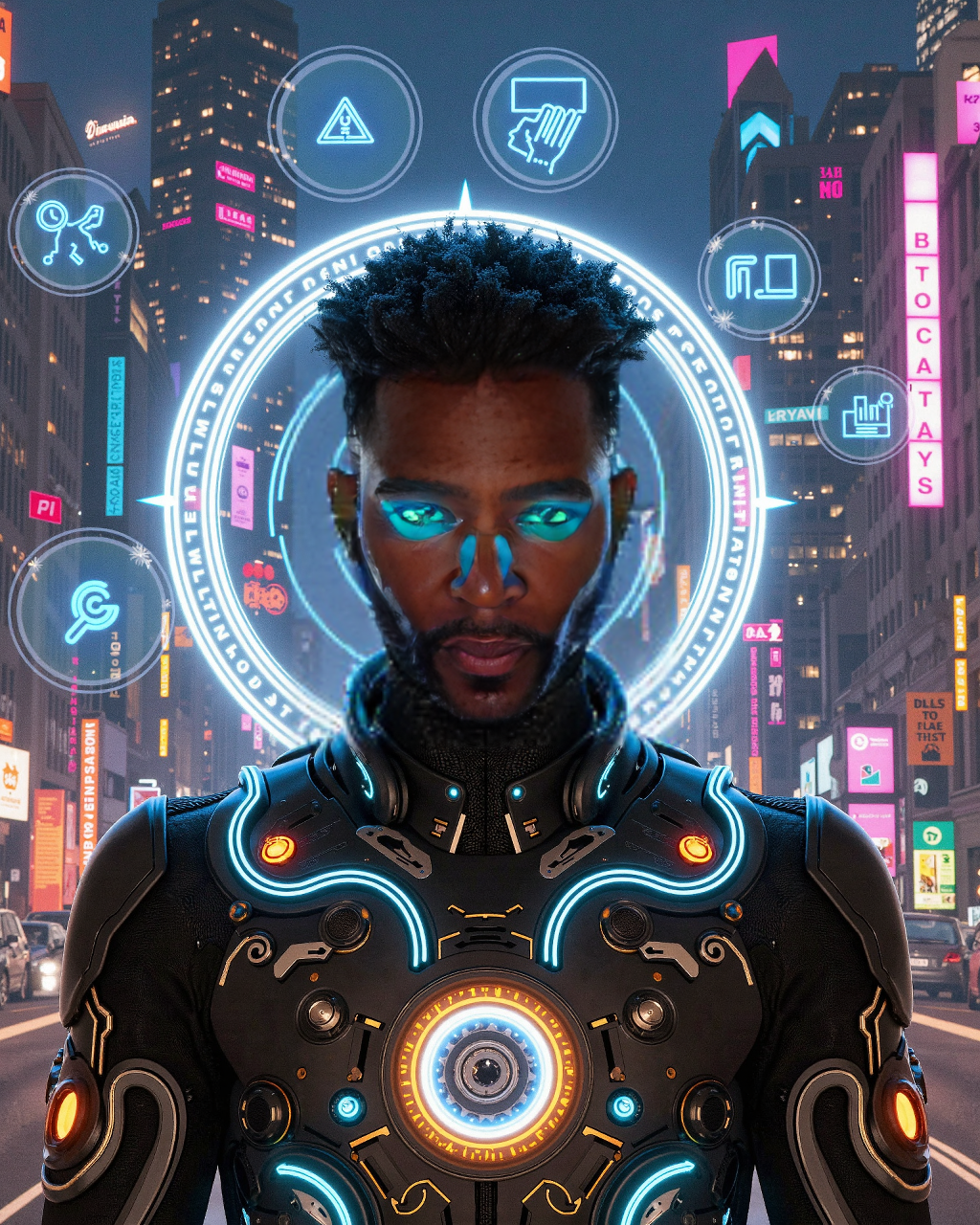
📚 High Level Summary:*
🔹 The Information Age made people rich by giving them access to knowledge.
🔹 The Intelligence Age will make people rich by giving them the ability to automate decision-making.
AI will replace workers, not thinkers. The people who leverage AI to scale productivity, automate businesses, and make data-driven decisions will dominate the next decade.
👉 The Play:
✅ Invest in AI-related stocks and blockchain infrastructure
✅ Learn how to build AI-powered businesses before AI becomes as common as Wi-Fi
✅ Own the platforms, don’t just use them
📌 THE INTELLIGENCE AGE REPRESENTS A FUNDAMENTAL SHIFT IN HOW WEALTH, POWER, AND OPPORTUNITY ARE DISTRIBUTED.
The Intelligence Age represents a fundamental shift in how wealth, power, and opportunity are distributed. Unlike the Information Age, where access to knowledge created new economic classes, the Intelligence Age is about the ability to automate decision-making at scale.
Those who understand this transition will shape the future, while those who fail to adapt will find themselves displaced by systems that operate faster, smarter, and more efficiently than human labor ever could.
Automation is not a new concept. Factories replaced manual labor with machines. Software automated office tasks, eliminating entire categories of jobs. But artificial intelligence takes this to another level—it is the first technology capable of replicating and even surpassing human decision-making.
AI will not only replace repetitive tasks but will also take over complex analytical work, disrupting industries from finance and healthcare to media and law.
The people who will thrive in this new era are those who move beyond simply using AI for convenience and begin deploying AI to replace entire business functions.
The highest-value skill of the next decade will not be coding or marketing—it will be understanding how to integrate AI into workflows that scale without human intervention. Every major technological revolution rewards those who build the infrastructure. The Intelligence Age will be no different.
Ownership is the central theme of this transition. History has shown that the real wealth does not go to those who merely participate in a system but to those who control its underlying platforms. The early internet rewarded those who created search engines, social networks, and e-commerce giants.
The Intelligence Age will reward those who build AI-powered ecosystems that allow others to interact with automation.
One of the most overlooked but crucial aspects of this shift is that AI-generated wealth must be protected from the increasing centralization of digital infrastructure. This is where blockchain technology plays a critical role.
AI is creating abundance, but blockchain ensures that ownership of this abundance is transparent, verifiable, and decentralized.
Smart contracts, tokenized assets, and decentralized autonomous organizations (DAOs) will provide new ways for individuals to control the value they generate rather than handing it over to large corporations.
The difference between those who thrive and those who get replaced will come down to positioning. Those who understand how to integrate AI into business models, automate processes, and leverage decentralized infrastructure for ownership will create the next generation of wealth.
Those who fail to recognize these shifts will find themselves on the wrong side of history, dependent on systems they do not control.
2032 is closer than most people think. The decisions made now—where to invest, what skills to develop, and what platforms to build—will determine who owns the future.
The Intelligence Age is not waiting. Those who hesitate will be left behind, while those who take action today will define the next era of technological and economic power.
🎥 PART 2: AI-GENERATED CONTENT & THE DEATH OF GATEKEEPERS
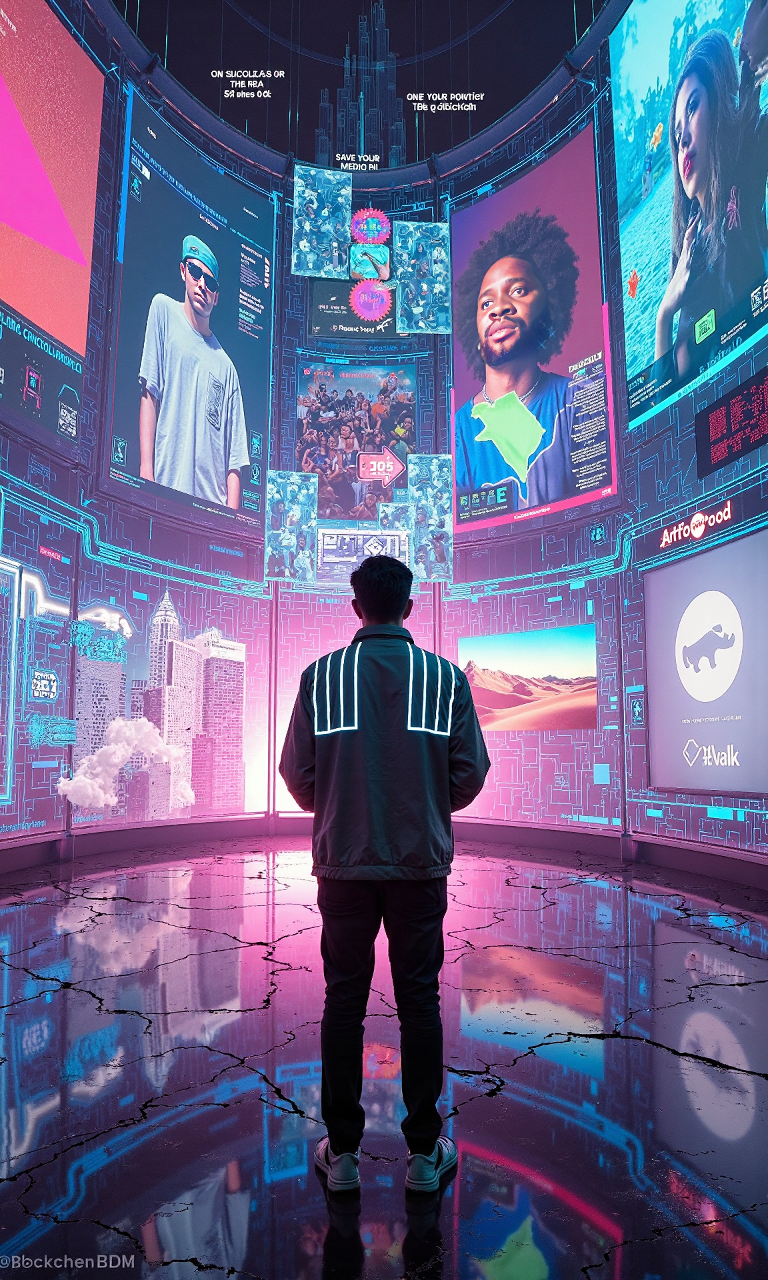
📚 High Level Summary:*
🔹 AI is changing the content creation landscape.
🔹 AI-generated content is already disrupting Hollywood and changing the game for small creators.
🔹 Own your IP—don’t rely on platforms that can deplatform you
Omnihuman-1 & The Disruption of Hollywood
ByteDance’s Omnihuman-1 can generate ultra-realistic AI humans in video from a single image. That means:
🔹 Actors & influencers are replaceable—why pay for a model when AI can generate a perfect one?
🔹 AI-generated movies & YouTube content will make studio-controlled entertainment obsolete
🔹 Small creators can compete with billion-dollar studios—if they understand AI
👉 The Play:
✅ Use AI-generated content to create media at scale
✅ Own your IP—don’t rely on platforms that can deplatform you
✅ Invest in AI tools that automate production
📌 Big takeaway: AI isn’t coming for your job—it’s coming for inefficient, outdated systems. If your job relies on legacy institutions, it’s time to adapt.
The rise of AI-generated content marks a defining moment in media history. For decades, traditional entertainment industries have operated under strict gatekeeping structures—movie studios, record labels, publishing houses, and social media platforms have determined what content reaches the masses. However, AI is now disrupting that system at its core, eliminating the need for many of the intermediaries that have historically controlled distribution, production, and creative talent pipelines.
ByteDance’s Omnihuman-1 is a clear indication of where this is headed. The ability to create ultra-realistic AI-generated video from a single image signals the end of an era for industries that depend on exclusive access to human talent. Hollywood’s reliance on actors, editors, and massive production budgets is now being challenged by AI-driven storytelling that can be generated at a fraction of the cost and time. This shift is not hypothetical—it is already happening.
The implications of this transformation are staggering. Actors and influencers who built their careers on charisma and relatability may soon find themselves in competition with AI avatars that never age, never make mistakes, and can be infinitely replicated. Meanwhile, AI-generated films, music, and books are beginning to flood digital platforms, reducing the need for traditional production teams. What happens when AI can produce an entire Netflix-level series in days, tailored to individual audience preferences? What happens when AI influencers with perfect engagement metrics dominate social media while human creators struggle to keep up?
For small creators, entrepreneurs, and independent storytellers, this is both an opportunity and a warning. The ability to create at scale without traditional funding or approval from legacy institutions is an unprecedented advantage. However, the more AI is used on platforms controlled by Big Tech, the greater the risk of deplatforming, demonetization, and algorithmic suppression. Many creators do not own their distribution channels, meaning that overnight, their audience reach and revenue streams could disappear at the whim of a platform’s policy change.
The lesson here is clear: IP ownership is non-negotiable. The future of content creation will belong to those who own their work and their audience, not just those who produce content on someone else’s platform. The question is not whether AI will change the creator economy—it already has. The question is: Who will control the tools that shape this new media landscape?
The answer lies in AI-powered tools that automate production while ensuring ownership. Whether through decentralized platforms, blockchain-based content verification, or independent distribution networks, creators who prioritize control over their work will not only survive but thrive. AI is not coming for individual jobs—it is coming for inefficient, outdated systems that failed to adapt to technological evolution.
For those still relying on legacy media structures, the warning is simple: Adapt now, or be replaced by those who do.
Watch: Omnihuman-1 Demo from My Instagram
🎥 PART 3: BEAU DEMAYO, X-MEN ‘97 & WHY OWNERSHIP MATTERS
📚 High Level Summary:*
🔹 Marvel doesn’t care about creators. Neither do most companies.
🔹 Beau DeMayo, the showrunner of X-Men ‘97, could be fired because he didn’t own the IP.
🔹 The Creator Economy is shifting—those who control their own media, audience, and distribution channels will win.
Marvel Doesn’t Care About Creators. Neither Do Most Companies.
Marvel’s X-Men ‘97 was one of their best projects in years. The culture loved it. The fans loved it.
So what did Marvel do? They fired the showrunner, Beau DeMayo.
🚨 Lesson: If you don’t own your work, you’re disposable.
Corporations don’t value creators. They value control.
🔹 DeMayo didn’t own his IP. That’s why he was fired.
🔹 Studios, publishers, and labels are just middlemen. You don’t need them anymore.
🔹 The Creator Economy is shifting—those who control their own media, audience, and distribution channels will win.
👉 The Play:
✅ Own your platform—build an email list, your own website, and decentralized content hubs
✅ Leverage blockchain for ownership—tokenized IP, smart contracts for royalties, and Web3 distribution
✅ Stop depending on companies that don’t care about you
🚨 2032 is the decade of ownership. Get in position.
The entertainment industry has always been a high-stakes power game, where the true winners are not the creatives, but the gatekeepers who control distribution, financing, and intellectual property. Marvel’s decision to fire X-Men ‘97 showrunner Beau DeMayo, despite the show’s massive success, is a reminder that in the traditional system, creators are disposable—IP is not.
DeMayo’s firing wasn’t about talent or audience reception. X-Men ‘97 was one of the most well-received Marvel projects in recent years, capturing the essence of a beloved franchise and resonating deeply with fans. And yet, none of that mattered because he didn’t own the rights to the story he brought to life. That’s the harsh reality of the entertainment business: creativity is valuable, but ownership is power.
This isn’t just a Marvel problem—it’s a systemic issue across all creative industries. Hollywood, the music industry, traditional publishing, and even social media platforms have all operated under the same playbook: extract value from creators while retaining ownership of their work. DeMayo, like many before him, contributed to a franchise that was never truly his to control, and as soon as the studio decided to move in a different direction, he was expendable.
In the past, this was just the way things worked. If you wanted your story to reach a mass audience, you needed a studio, a publisher, or a label to finance and distribute it. That’s no longer true. The Creator Economy, powered by AI, decentralized media, and blockchain technology, is making it possible for individuals to own their content, monetize their audience, and bypass traditional gatekeepers altogether.
The future will belong to those who build their own platforms and control their own distribution. The most successful creators of the next decade won’t just be storytellers—they’ll be media entrepreneurs, structuring their projects with the same level of strategic ownership that business moguls have used for generations.
This shift isn’t just theoretical; it’s already happening. Independent creators are using Web3 technology to tokenize IP, monetize through direct fan engagement, and create smart contracts that ensure they get paid indefinitely. Platforms like Patreon, Substack, and decentralized streaming services are proving that you don’t need a studio or publisher to build a sustainable, profitable media business.
For those still chasing traditional deals, hoping that a studio or network will “do right by them,” the warning is clear: The system is designed to extract value from you, not empower you. The sooner you shift your mindset from getting a seat at the table to building your own, the sooner you’ll reclaim control over your creative future.
Ownership isn’t just about financial security—it’s about creative freedom and long-term control over your work. DeMayo’s firing is a cautionary tale, but it’s also an opportunity. The Creator Economy isn’t just changing who gets paid—it’s changing who gets to tell their stories on their own terms.
Watch: Beau DeMayo's Statement on the Firing
You decide if this is a fair firing or not. There is some controversy around this and nuance to the story. But the point is that ownership matters and you need to own your IP.
💰 PART 4: THE 2032 INVESTMENT BLUEPRINT
If you want real wealth, you need to be investing in the assets of the future. Here’s where you should be putting your money:
✅ AI & Tech Stocks
🔹 NVIDIA & AMD (AI hardware & GPUs)
🔹 Microsoft & Google (Cloud AI dominance)
🔹 OpenAI & AI-powered SaaS (The next Google)
✅ Crypto & Blockchain
🔹 Bitcoin & Ethereum (The decentralized financial layer)
🔹 Layer-2 scaling solutions (Arbitrum, Optimism, zkSync)
🔹 AI-driven blockchain protocols (Worldcoin, Fetch.ai)
✅ The Creator Economy
🔹 AI-powered content creation tools (RunwayML, Midjourney, ElevenLabs)
🔹 Decentralized media platforms (Lens Protocol, Farcaster)
🔹 Personal brands that own distribution
👉 The Play:
✅ Start dollar-cost averaging into AI and crypto
✅ Leverage tax-efficient investment strategies
✅ Stop thinking like a consumer. Start thinking like a builder.
🚀 The Intelligence Age will produce billionaires. Will you be one of them?
🚨 FINAL WARNING: BUILD OR BE LEFT BEHIND
2032 isn’t some far-off sci-fi future. It’s eight years away.
The world will not look the same:
🔹 AI will be integrated into every industry—if you’re not using it, you’ll be at a disadvantage.
🔹 Jobs will disappear—but those who create jobs and automate workflows will thrive.
🔹 Decentralization will reshape media & finance—are you building ownership now?
🔥 The people who will control the next decade are already learning, investing, and creating.
🚨 The question is: Will you?
📍 NEXT STEPS: GET INVOLVED
Grown & Techie LIVE | Atlanta – February 22, 2025
📍 The Gathering Spot, ATL
✅ Deep discussions on AI, blockchain & wealth creation
✅ Network with forward-thinkers & innovators
✅ FREE copy of my upcoming book (dropping 4/25/25) for all attendees
📌 Spots are limited—RSVP now! Click here to RSVP
🎧 Podcast Spotlight: This Week’s Episode
"From Setbacks to Millions: How Smitty The Goat Built an Empire with Business Credit" –
This week on Deeper Than Code, I sit down with Kenny "Smitty The Goat" Smith, who turned financial struggles into financial freedom by mastering business credit & entrepreneurship.
💰 How Smitty rebuilt his credit & leveraged it to scale multiple businesses
💡 The mindset shifts that turned setbacks into success
📈 The exact strategies he used to turn credit into capital
If you’re an entrepreneur looking to unlock business funding, scale faster, and build generational wealth, this episode is a must-watch.

